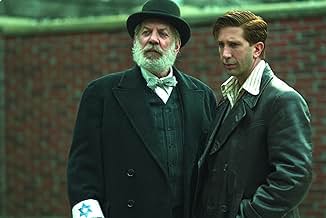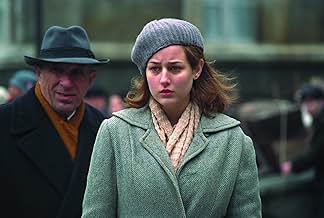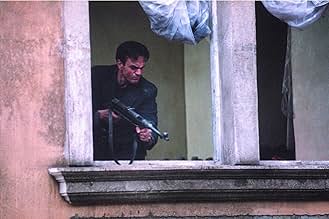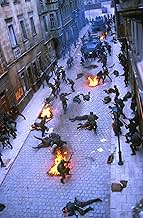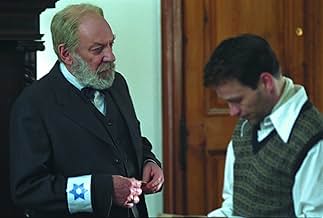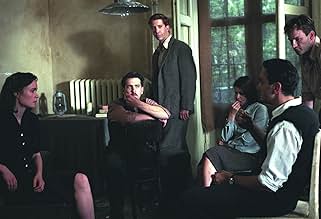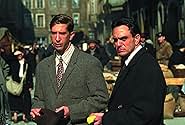ÉVALUATION IMDb
7,2/10
5,2 k
MA NOTE
Ajouter une intrigue dans votre langueJews rise up in the Warsaw Ghetto against the Nazis in 1943.Jews rise up in the Warsaw Ghetto against the Nazis in 1943.Jews rise up in the Warsaw Ghetto against the Nazis in 1943.
- A remporté 1 prix Primetime Emmy
- 5 victoires et 17 nominations au total
Histoire
Le saviez-vous
- AnecdotesFinal credited project of composer Maurice Jarre.
- GaffesHistorically, the "tanks" used by the Germans during the suppression of the uprising were actually French light assault guns Lorraine 37L - which means there was not a single Tiger tank (not to mention two). Also, the SS troops were "police" and training/reserve units (rear formations), not the front-line troops.
- Citations
Mordechai Anielewicz: Can a moral man, that's me, maintain his moral code in an immoral world?
- Autres versionsR1 DVD runs 177'15" (NTSC), but European releases only 152'28" (PAL) (a difference of almost 18'26" allowing for the different frame rates).
- ConnexionsEdited into Resistance (2001)
- Bandes originalesPiano Sonata No. 14 in C sharp minor, Op. 27 No. 2 'Moonlight'
Written by Ludwig van Beethoven
Performed by Sympho Inc. Studio Orchestra (Bratislava, Slovenia)
Commentaire en vedette
WWII, and the Holocaust in particular, is a very interesting subject. There has probably never been more interest from the public towards everything that concerns this war, which started already more than 65 years ago. Every week new books, documentaries,... are published with new theories, with evaluations of some important (often Nazi) personalities, with information about the concentration camps,... Because most of the survivors have already died or will die soon, the stories of the last eye-witnesses will get lost if not registered on tape or camera. But all these stories are also a good base for movies and mini-series like this "Uprising".
"Uprising" tells the story of the Nazi oppression of the Jews in the Ghetto of Warshaw and their rebellion against it, which started in 1943. It all begins in 1939 with the growing list of prohibitions and regulations leading to the virtual imprisonment of about half-a-million Polish Jews in an old district of Warsaw. Their daily struggle against hunger and disease is made even worse when the Nazis demand for "deportations to the east". Many begin to suspect that the deportation of these groups of laborers are actually camouflaged mass murders and at the end of 1942 they start to realize that they are all doomed. They decide that, if they have to die, they better die in honor by taking up the arms against their oppressors. They start building hidden shelters and bunkers in the basements and cellars of the buildings, often with tunnels leading to other buildings and start collecting arms and ammunition for the battle which will begin on 19 April 1943...
Even though I must say that overall I liked the series, I can't say that it was always very convincing. There were a couple too many problems with it that really bothered me. One for instance is the way all the people are depicted. The heroic Jews don't have to expect any help from the arrogant and anti-semitic Polish Catholics who know exactly what is going on, but don't care. The Poles only want to help when offered enormous amounts of money and even then are very reluctant. In reality the Poles also suffered a lot under the German oppression and without their help there would probably never have been a Jewish Uprising. And no, I'm not a Pole myself, so I'm not saying this to justify my people's actions, it's just the way it was.
Another thing that I really didn't like was the use of the languages. The Germans speak English most of the time, except for when they are giving some short orders, than you'll hear them talk German. The producers and director have to make a choice, either they all speak German or English, but not a mix of the two. And about the language I also have another remark. Can someone please tell me why those purely American actors, who all know how to speak normal English, speak with that funny, but also incredibly annoying accent? Do they really believe I will not recognize Leelee Sobieski, David Schwimmer,... when they talk in a slightly different way? I'm not asking that they speak Polish, I'm sure they can't, but don't make a fool out of yourself by trying to convince people that you are talking another language, just by adding such an accent, it can never work...
Still, even though the series isn't always historically accurate, uses a range of annoying accents and is too stereotypical when it comes to the roles of the different people, not everything about it was that bad. The acting for instance is good. In my opinion this was the best role I've ever seen Leelee Sobieski play and all the other actors did a nice job too. I certainly liked Jon Voight as Major General Jurgen Stroop, but it is Cary Elwes, who played Fritz Hippler (the director of "Der Ewige Jude" or "The Eternal Jew"), who certainly deserves to be mentioned as well.
All in all this isn't a bad series. If you try to see it as a drama based on actual events, rather than to see it as a 'documentary reconstruction', than you certainly should be able to enjoy it. There are some nice action scenes, some good acting and other interesting features. You just will have to try to see past some major flaws... I give this series a score between 7/10 and 7.5/10.
"Uprising" tells the story of the Nazi oppression of the Jews in the Ghetto of Warshaw and their rebellion against it, which started in 1943. It all begins in 1939 with the growing list of prohibitions and regulations leading to the virtual imprisonment of about half-a-million Polish Jews in an old district of Warsaw. Their daily struggle against hunger and disease is made even worse when the Nazis demand for "deportations to the east". Many begin to suspect that the deportation of these groups of laborers are actually camouflaged mass murders and at the end of 1942 they start to realize that they are all doomed. They decide that, if they have to die, they better die in honor by taking up the arms against their oppressors. They start building hidden shelters and bunkers in the basements and cellars of the buildings, often with tunnels leading to other buildings and start collecting arms and ammunition for the battle which will begin on 19 April 1943...
Even though I must say that overall I liked the series, I can't say that it was always very convincing. There were a couple too many problems with it that really bothered me. One for instance is the way all the people are depicted. The heroic Jews don't have to expect any help from the arrogant and anti-semitic Polish Catholics who know exactly what is going on, but don't care. The Poles only want to help when offered enormous amounts of money and even then are very reluctant. In reality the Poles also suffered a lot under the German oppression and without their help there would probably never have been a Jewish Uprising. And no, I'm not a Pole myself, so I'm not saying this to justify my people's actions, it's just the way it was.
Another thing that I really didn't like was the use of the languages. The Germans speak English most of the time, except for when they are giving some short orders, than you'll hear them talk German. The producers and director have to make a choice, either they all speak German or English, but not a mix of the two. And about the language I also have another remark. Can someone please tell me why those purely American actors, who all know how to speak normal English, speak with that funny, but also incredibly annoying accent? Do they really believe I will not recognize Leelee Sobieski, David Schwimmer,... when they talk in a slightly different way? I'm not asking that they speak Polish, I'm sure they can't, but don't make a fool out of yourself by trying to convince people that you are talking another language, just by adding such an accent, it can never work...
Still, even though the series isn't always historically accurate, uses a range of annoying accents and is too stereotypical when it comes to the roles of the different people, not everything about it was that bad. The acting for instance is good. In my opinion this was the best role I've ever seen Leelee Sobieski play and all the other actors did a nice job too. I certainly liked Jon Voight as Major General Jurgen Stroop, but it is Cary Elwes, who played Fritz Hippler (the director of "Der Ewige Jude" or "The Eternal Jew"), who certainly deserves to be mentioned as well.
All in all this isn't a bad series. If you try to see it as a drama based on actual events, rather than to see it as a 'documentary reconstruction', than you certainly should be able to enjoy it. There are some nice action scenes, some good acting and other interesting features. You just will have to try to see past some major flaws... I give this series a score between 7/10 and 7.5/10.
- philip_vanderveken
- 21 juin 2005
- Lien permanent
Meilleurs choix
Connectez-vous pour évaluer et surveiller les recommandations personnalisées
Détails
Box-office
- Brut – à l'échelle mondiale
- 9 266 $ US
- Durée2 heures 57 minutes
- Couleur
- Mixage
- Rapport de forme
- 1.85 : 1
Contribuer à cette page
Suggérer une modification ou ajouter du contenu manquant

Lacune principale
By what name was 1943, l'ultime révolte (2001) officially released in India in English?
Répondre
